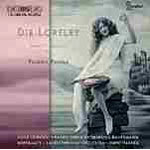
Die Loreley (Opera in two acts sung in the original German)
 $63.00
Out of Stock
$63.00
Out of Stock6+ weeks add to cart
FREDRIK PACIUS
Die Loreley (Opera in two acts sung in the original German)
Soile Isokoski (soprano) Raimo Sirkia (tenor) Cornelius Hauptmann (bass) Riikka Rantanen (mezzo-soprano) / Lahti Symphony Orchestra / Osmo Vanska
[ BIS / 2 CD ]
Release Date: Thursday 18 March 2004
This item is currently out of stock. It may take 6 or more weeks to obtain from when you place your order as this is a specialist product.
"The first recording of an opera premiered in 1887. Congratulations are due to all those involved in rescuing from oblivion a work that never deserved such a fate"
(ClassicWeb)
"Congratulations are due to the Lahti SO and all those involved, in rescuing from oblivion a work that never deserved such a fate."
(MusicWeb)
Finland's grandest opera - sung in the original German - recorded for the first time. (The booklet includes a complete translation of the libretto.) With Osmo Vänskä conducting and the leading role sung by Finland's latest operatic megastar Soile Isokoski.
Finland is unique! This tiny country has created a cultural identity that is recognized, and envied, all over the world. In musical terms Finland is a modern superpower, turning out singers, conductors, instrumentalists and composers of world class in a seemingly unstoppable flood. And in the field of contemporary opera Finland simply leads the field. From Kokkonen's The Last Temptations via Sallinen's The Horseman and The Red Line and, most recently Rautavaara's Rasputin, Finnish operas have been vastly successful all over the world - aided greatly by the acting abilities of such great singers as Jorma Hynninen, the late, much lamented Martti Talvela, Karita Mattila et al.
For most of us, Finnish music begins with Sibelius. But there was naturally a musical culture for Sibelius to grow up in. The leading musical figure in Finland at the time of Sibelius' birth was, undoubtedly, Fredrik Pacius (1809-1891). Pacius was actually born in Hamburg and he studied the violin with no less a figure than Louis Spohr before settling in Helsinki as lecturer in music in 1835. Despite Pacius's German origins, he is considered the father of Finnish music and is even responsible for the Finnish national anthem.
Pacius may have made his major contribution to Finnish music as a teacher and organizer of music but he was also a thoroughly competent composer in the spirit of Mendelssohn and his teacher Spohr. His compositional legacy includes two operas. His second attempt, Die Loreley, is opera in the Grand tradition. Despite being an almost exact contemporary of Wagner it was not from Bayreuth that he sought inspiration. Rather, it was the older French tradition of opera that he followed. Die Loreley, composed in 1887 to a German libretto, is a splendidly romantic work set in "Loreley country" with treacherous rocks in the Rhine at evening, storms and lightning, passion and betrayal.
Soile Isokoski, winner of both the Elly Ameling and the Tokyo singing competitions, leads a strong cast. The Lahti Symphony Orchestra enjoy themselves thoroughly in this colourful and melodramatic score and Osmo Vänskä clearly relishes the task of moulding the whole into a convincing musical narrative. Today we may find difficulty in hearing the "Finnish" element in the music that the critics of the first performance heard. Yet, given the rich musical culture that has developed in Finland there is an intrinsic interest in looking at its roots. In the case of "Loreley" and Pacius, no excuses need to be made - this is a substantial work by a composer who expertly develops the melodramatic elements of his work. Another important - and listener friendly! - "first" on BIS. (The booklet includes a complete translation of the libretto.)

